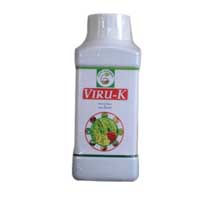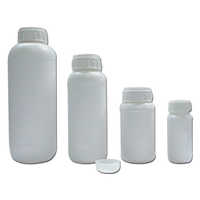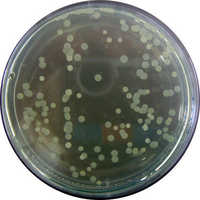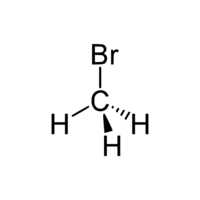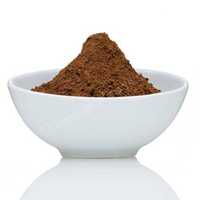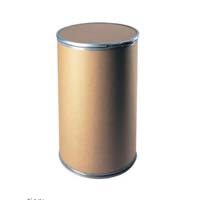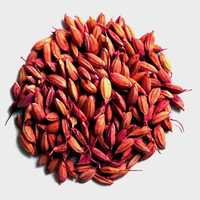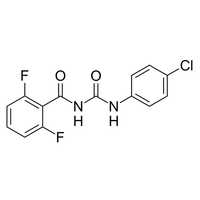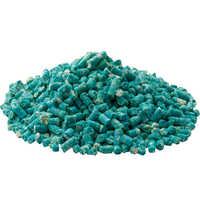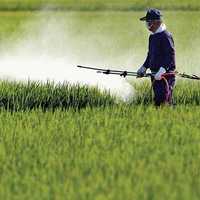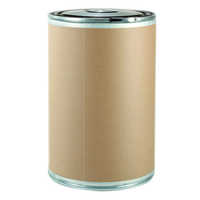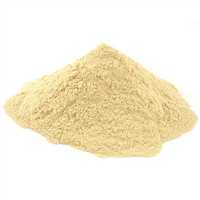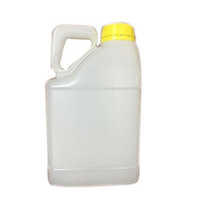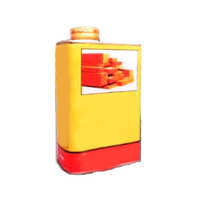Pesticides
(9343 products)
Pesticides are substances used to kill insects and are primarily employed in agriculture, medicine, industry, and by consumers. Organic pesticides, as opposed to chemical pesticides, are derived from natural sources and are considered safer for the environment and soil. These organic formulations are recommended for managing insects that feed on crops and are less likely to induce resistance in plant pathogens. Pesticides are vital for controlling pests, protecting crops, and eliminating disease-carrying insects.
...show morePesticides are substances used to kill or control pests, such as insects, rodents, and weeds. They can be chemical or organic, and are used in a variety of settings, including agriculture, pest control, and home gardening.
There are many different types of pesticides, including insecticides, herbicides, fungicides, and rodenticides. Each type of pesticide is designed to target a specific type of pest.
Pesticides are typically applied to the target pest or its habitat. They can be applied in a variety of ways, including spraying, dusting, and fogging.
Pesticides can pose a variety of risks to human health and the environment. Some pesticides are toxic to humans and animals, and can cause a variety of health problems, including cancer, reproductive problems, and developmental disorders. Pesticides can also harm beneficial insects and wildlife, and can contaminate water and soil.
There are a number of ways to reduce your exposure to pesticides. These include buying organic produce, avoiding the use of pesticides in your home and garden, and following the directions on pesticide labels carefully.
Explore More Categories
95 Percent Malathion Tech Pesticides Application: Agriculture
Price: 1500 INR (Approx.)/Kilograms
MOQ- 100 Kilograms/Kilograms
Color - Any Color
Classification - Biological Pesticide
Release Type - Controlled
3 Years
Chemicals & Allied Products
Rdx Super Biopesticide Application: Agriculture
Price: 1 INR (Approx.)/Bottle
MOQ - 10 Bottle/Bottles
Classification - Biological Pesticide
Release Type - Quick
Purity(%) - <95%
15 Years
Business Type: Manufacturer | Distributor
REDOX INDUSTRIES LIMITED
Indian Inquiries Only
Bio Bph (Brown Plant Hopper) Control Pesticides For Paddy Rice Application: Agriculture
Price: 1500 INR (Approx.)/Kilograms
MOQ - 50 Kilograms/Kilograms
Classification - Plant Growth Regulator
Release Type - Controlled
Purity(%) - 98% 99% 100%
5 Years
Business Type: Manufacturer | Distributor
DESTINY CHEMICALS
Bio Pesticides Application: Agriculture
Price Trend: 500.00 - 2500.00 INR (Approx.)/Kilograms
MOQ - 1000 Kilograms/Kilograms
Classification - Biological Pesticide
Physical State - Liquid
Application - Agriculture
5 Years
Business Type: Manufacturer | Exporter
TANVI BIO CHEMICAL PVT. LTD.
Agricultural Bio Pesticides
Price: 4040 INR (Approx.)/Piece
MOQ - 1 Piece/Pieces
7 Years
Business Type: Manufacturer | Distributor
EAGLE PLANT PROTECT PVT. LTD.
Indian Inquiries Only
Hulk Organic Pesticide Application: Agriculture
Price Trend: 950.00 - 1050.00 INR (Approx.)/Liter
MOQ - 10 Liter/Liters
Release Type - Controlled
Purity(%) - 98% 99% 100%
Application - Agriculture
4 Years
Response Rate: 76.19%
Business Type: Manufacturer
HEXA AGRO INDUSTRIES
Indian Inquiries Only
PACER
Price: nan INR (Approx.)/Kilograms
MOQ - 10 kilograms Kilograms/Kilograms
Product Name - PacerA(r)
State - Powder
21 Years
Business Type: Manufacturer | Exporter
AGRI LIFE(INDIA) PRIVATE LIMITED
Transparent Or Pale Yellow Silicone Adjuvant
Price: 440 INR (Approx.)/Liter
MOQ - 50 Liter/Liters
Color - Transparent or pale yellow
Classification - Other
Release Type - Controlled
4 Years
Business Type: Manufacturer | Supplier
INNOVAC BIOSCIENCE PVT LTD
Pretilachlor 50% Ec Application: Agriculture
Price Trend: 210.00 - 450.00 INR (Approx.)/Liter
MOQ - 100 Liter/Liters
State - Liquid
Purity(%) - 50%
Product Name - Pretilachlor
9 Years
Business Type: Manufacturer | Exporter
RAM SHREE CHEMICALS
Herbal Bio Pesticide Application: Agriculture
Price: 1200 INR (Approx.)/Liter
MOQ - 100 Liter/Liters
Classification - Other, Pesticide
Release Type - Controlled
Purity(%) - 98% 99% 100%
1 Years
Business Type: Manufacturer | Exporter
GROWRICH AGROTECH INDIA PVT LTD
Indian Inquiries Only
Organic Pesticides Application: Pest Control
MOQ - 1 Kilograms/Kilograms
Classification - Insecticide
Purity(%) - 98% 99% 100%
Application - Pest Control
2 Years
Business Type: Manufacturer | Exporter
FUTUREY BIO
Insecticide Pest Controller
Price: 75 INR (Approx.)/Box
MOQ - 10 Box/Boxes
Application - Pest Control
Type - Insecticide
5 Years
Business Type: Manufacturer | Supplier
GROWILL AGROTECH
Indian Inquiries Only
Transparent Industrial Pesticides
MOQ - 100 Liter/Liters
Release Type - Controlled
Purity(%) - 98% 99% 100%
Application - Chemical Pesticide
2 Years
Business Type: Manufacturer | Distributor
GOLDEN FINECHEM PVT LTD
Agriculture Nema Power Controlled Release Type
Price: 985 INR (Approx.)/Pack
MOQ - 10 Pack/Packs
Release Type - Controlled
Application - Agriculture
Type - Insecticide
3 Years
Business Type: Manufacturer | Exporter
K. N. BIO SCIENCES (INDIA) PVT. LTD.
Insect Control Liquid Application: Agriculture
Price: 39 INR (Approx.)/Milliliter
MOQ - 100 Milliliter/Milliliters
Classification - Biological Pesticide
Purity(%) - 98% 99% 100%
Application - Agriculture
1 Years
Business Type: Manufacturer | Distributor
GREEN AGRI SOLUTION
orgenic pesticide
Price: 4000.00 INR (Approx.)/Bottle
MOQ - 20 Bottle/Bottles
10 Years
Business Type: Manufacturer | Distributor
PROXIMA BIO-TECH PVT LTD.
Indian Inquiries Only
Propoxure 20 % EC
Price: 1600 INR (Approx.)/Liter
MOQ - 100 Liter/Liters
11 Years
Business Type: Manufacturer | Exporter
Kalyani Industries Ltd.
Halosulfuron Methyl 75% WG
Price: 25500 INR (Approx.)/Kilograms
MOQ - 100 Kilograms/Kilograms
7 Years
Response Rate: 88.89%
Business Type: Manufacturer | Supplier
LAFORD AGROTECH LIMITED
Perfect Shikaro Bio Pesticides Application: Agriculture
Price: 500 INR (Approx.)/Bottle
MOQ - 10 Bottle/Bottles
Classification - Biological Pesticide
Purity(%) - 98% 99% 100%
Application - Agriculture
3 Years
Response Rate: 88.46%
Business Type: Manufacturer | Supplier
Perfect Cropscience Pvt. Ltd.
Indian Inquiries Only
O Chlorobenzoic Acid
Price: 20 INR (Approx.)/Kilograms
MOQ - 25 Kilograms/Kilograms
15 Years
Business Type: Manufacturer | Distributor
JIGCHEM UNIVERSAL
Bio Larvicide Quick Release Type
Price: 850 INR (Approx.)/Liter
MOQ - 100 Liter/Liters
Release Type - Quick
Storage - Dry Place
Dosage - As per suggestion
2 Years
Business Type: Manufacturer | Distributor
A & K Bios
Azadirachtin Technical Powder (Up To 40%) Dry Place
Price: 100000 INR (Approx.)/Kilograms
MOQ - 10 Kilograms/Kilograms
Product Type - Other , Azadirachtin Technical Powder
Effective For - Other
Storage Instructions - Dry place
3 Years
Business Type: Manufacturer | Distributor
AURA BIOTECHNOLOGIES PRIVATE LIMITED
Imidacloprid 70Wg Application: Pest Control
Price: 2500 INR (Approx.)/Kilograms
MOQ - 10 Kilograms/Kilograms
Classification - Insecticide
Application - Agriculture, Agrochemical, Pest Control, Chemical Pesticide
Type - Insecticide
12 Years
Response Rate: 88.46%
Business Type: Manufacturer | Distributor
CELLGENE BIO SCIENCE
Indian Inquiries Only
Pesticides Manufacturers | Suppliers in India
| Company Name | Location | Member Since |
|---|---|---|
| Agri Life(India) Private Limited | Hyderabad, India | 21 Years |
| Sikko Industries Ltd. | Ahmedabad, India | 17 Years |
| Redox Industries Limited | Ahmedabad, India | 15 Years |
| Jigchem Universal | Mumbai, India | 15 Years |
| Cellgene Bio Science | Rajkot, India | 12 Years |
| Kalyani Industries Ltd. | Mumbai, India | 11 Years |
| Riddhi Speciality Chemicals | Panoli, India | 10 Years |
| Proxima Bio-Tech Pvt Ltd. | Ahmedabad, India | 10 Years |
| Ram Shree Chemicals | Mumbai, India | 9 Years |
| Central Biotech Private Limited | Nagpur, India | 9 Years |
Pesticides - A brief history
Advanced agriculture tools and measures can boost success in the contemporary world. For a long time, humans have utilized agriculture pesticides for the severe protection of crops. Since 2000 BC, pesticides have been put to use for boosting the production rate and yield. These chemicals have worked wonderfully in the past and have contributed to the efficiency of food production. By the 15th century, different chemicals, such as mercury were introduced for killing the pests.
The Science of Pesticides
The science of pesticides significantly revolves around the chemicals that are of incredible importance in the protection of crops from pests, insects, . These are chemical pesticides that can hamper the growth of insects and keep rodents away. In agriculture sector, these chemicals can be used extensively following certain precautions and regulations. The science studying these topics is often called ecology or molecular biology. They work by interfering with the biological movements and systems of pests. It can either be a disruption of the nervous system or hamper the reproduction process of them.
Types, Effects, and Benefits of Pesticides
There is a numerous range of pesticides that are designed and formulated in a way to kill or control specialised pests. Insecticides are mainly formulated for controlling insects such as mosquitoes and beetles. They are applied to the plants and soil for killing the insects. Herbicides are specifically designed for controlling the growth of undesirable vegetation. They can be notably specific in order to target selective plant species. Rodenticides are formed by attacking the mice that enter the crop field. Similarly, nematicides and fungicides are primarily used for killing worms and fungi, respectively.
It is time to ponder over the effects of using pesticides, like chlorpyriphos 10% GR, neem powder, propoxure 20 % Ec and more. These are chemical compounds that are used in the agricultural sector and similar industries aimed at controlling pests. Excessive use of pesticides can sometimes contaminate soil or water components if not used in moderate dosage. Many times, the overuse of such chemicals can have adverse effects on harmless insects and birds. Therefore, it is crucial for handling them with high safety and in safe disposal ways. Some farmers try to use a small amount of them along with biological controls and strategies, which can eventually reduce the negative effects.
Discussing the benefits associated with the use of pesticides is highly relevant. These chemical compounds play a key role in increasing food production. Obviously, food quality is of utmost importance. Food or crops which are less affected by insects, rodents are appreciated in the market and considered highly valuable. The pesticides can be further used for controlling home insects too. The use of these chemical compounds can significantly increase the sustainability of agriculture.
Choosing the Right Pesticide for Your Needs
Choosing the correct category of pesticide for targeting specialized pesticides is an important step. There are other factors, too, that directly and indirectly influence the selection of pesticides. The first and foremost step is to identify the type of pest that has to be targeted, which can be helpful in selecting the right product. The formulation or chemical composition is the next criterion which can be someone's personal choice. Choosing pesticides with less toxicity is mainly recommended. There are several organic pesticides that are available in powder and liquid forms. The way of targeting also plays an essential role, like whether the nervous system has to be attacked or the reproductive system is to be affected.
Alternatives to Pesticides
While the practice of using pesticides has become highly common in the agricultural industry, some farmers seek out alternatives to pesticides to keep their crops free from chemicals and their effects. IPM, which is popularly known as integrated pest management, is another effective way for controlling the pests on the farm. This technique uses biological controls such as predators and planting of pest-resistant species. For illustration, marigolds are planted with vegetables to repel pests. Secondly, the pests are also controlled and several physical methods are put into use, such as nets in the form of physical barriers. Hand-picking is also commonly practiced.
Safe and Effective Pesticide Use
Safe and effective pesticide usage is of critical importance not only for crops and the environment but also for human health. Various measures crucially determine the safe usage of these chemical compounds. Labels for pesticides with relevant points and instructions about the product must be read carefully to keep valuable precautions and safety measures in mind. Following instructions appropriately is important for their applications. Wearing protective clothing along with masks and gloves can prevent the spread of toxic chemicals and their associated hazardous effects when inhaled. Storing bottles or containers containing pesticides should always be done away from pets and kids.
FAQs: Pesticides
Q. What are pesticides?
Ans. Pesticides are chemical compounds produced in laboratories for their applications in the farm sector. The innovation of pesticides has surely revolutionized the way food crops are protected from pests and disease-causing organisms. In modern agriculture, the demand for these chemicals is noticeably rising. It has been researched that using them can improve yield or production along with satisfactory food security. Without the use of pesticides, it becomes highly challenging to grow enough food crops to feed the human population because a large percentage of those crops will be damaged by rodents, insects, weeds, and fungi. Pesticides also enable farmers to avoid the manual labor associated with hand-picking methods to control pests.
Q. How do pesticides work?
Ans. Pesticides are effective tools in the farm sector with a specialised purpose. They are accepted in the applications of modern agriculture and public health sectors. They are known to work in different ways, depending on the specific type of pesticide with a selective mode of action. This is because some chemicals are made for attacking the nervous system of the pests (leading to organism' paralysis) , some kill them, and some disrupt their biological processes, specifically reproduction processes, to hamper their spread.
Q. What are the different types of pesticides?
Ans. Pesticide types and categories are determined by the pests with which they must interact. In other words, some pesticides can be highly effective on certain crops but not on others. For example, insecticides are intended to hamper the biological processes of mosquitoes and beetles. Whereas, fungicides are responsible for killing fungi and related microbes.
Q. What are the regulations surrounding pesticide use?
Ans. For maintaining the good health of humans and the environment, certain regulations must be kept in mind, aimed at ensuring pesticides' right usage. Undoubtedly, there are negative impacts on humans and the biosphere with the use of chemical compounds. But they can be significantly minimized to a great extent via certain ways. Checking the labels and following the instructions with a high focus is recommended. Some pesticides are made for specialized applications and cannot be used in any farm field. They are labeled or classified as restricted in use for only allowing certified applicators to usage.
Related Categories
Acid
Activated Carbon
Adhesives & Sealants
Aerosols
Agro Chemicals
Bactericides
Chemical Additives
Chemical Processing Plants
Chemical Reagent
Chemical Supplies
Chemicals Agents
Chemicals Stocks
Cleaning Chemicals
Construction Chemicals
Corrosion Protection Materials
Detergent Powder & Cakes
Detergent Raw Material
Dyes
Dyes Intermediates
Dyestuffs
Elementary Substance
Emulsifiers
Fertilizers
Fine Chemicals
Flavours & Food Additives
Fluorescent Brightening Agent
Fodder & Feed Additives
Fungicides
Glue & Gelatin
Gum & Gum Products
Herbicides
Industrial Chemicals
Industrial Gases
Inorganic Acid
Inorganic Chemicals & Compounds
Inorganic Salt
Insecticides
Lab Chemicals & Supplies
Masterbatches
Natural Dyes
Natural Rubber
Nematicides
Organic Acid
Organic Chemicals & Compounds
Organic Salt
PVC Compounds
PVC Resins
Paint & Allied Products
Paper Chemicals
Perfumes & Fragrances
Pesticides
Pigments
Plant Growth Regulator
Plasticizer
Polyethylene Foam Films
Polymers
Polyurethane Products
Powder Coating Chemicals
Printing Oil
Resin
Rubber & Rubber Products
Rubber Chemicals
Silica Gel
Silicon Products
Soap & Hand Wash
Soil Conditioners
Solvents
Sulphur
Synthetic Rubber
Textile Chemicals
Texture Paint
Ultramarine Blue
Water Treatment Chemicals
Waterproofing Chemicals
Wax & Wax Products
X-Ray Chemicals
